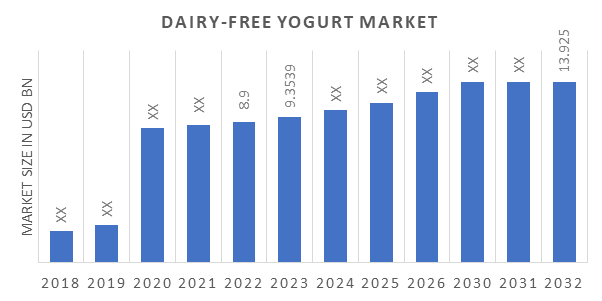The dairy-free yogurt market has been experiencing remarkable growth in recent years, driven by changing consumer preferences and increasing awareness of the health benefits associated with dairy-free alternatives. With the rise of lactose intolerance, dairy allergies, and a growing vegan population, dairy-free yogurt has carved out a significant niche within the broader yogurt industry. In this blog, we will delve into the trends, market report, analysis, growth factors, market overview, segmentation, and key players shaping the dairy-free yogurt market.
The Dairy-free Yogurt market industry is projected to grow from USD9.3539 Billion in 2023 to USD 13.9256 billion by 2032, exhibiting a compound annual growth rate (CAGR) of 5.10% during the forecast period (2023 – 2032)
The dairy-free yogurt market trend has experienced a remarkable surge in recent years, reflecting a growing consumer shift towards plant-based and lactose-free alternatives. This trend is primarily driven by health-conscious individuals seeking nutritious and sustainable options, as well as those with lactose intolerance or dairy allergies. With an ever-expanding range of dairy-free yogurt products made from plant-based sources like soy, almond, coconut, and oat, consumers now enjoy a diverse selection of flavors and textures. Additionally, the market has seen a surge in innovative probiotic-rich formulations, further enhancing its appeal as a health-conscious choice. As this market continues to evolve, it is evident that dairy-free yogurt is here to stay as a prominent player in the broader plant-based food movement.
Market Overview
Dairy-free yogurt, also known as plant-based yogurt, is derived from various sources such as soy, almond, coconut, oat, and cashew. These alternatives provide a creamy and nutritious option for individuals seeking dairy-free or vegan alternatives. The market has witnessed exponential growth in recent years, driven by several key factors:
Health Consciousness: Consumers are increasingly mindful of their health and wellness. Many are turning to dairy-free yogurt as a source of probiotics, plant-based proteins, and essential nutrients without the potential drawbacks of dairy, such as lactose intolerance and saturated fats.
Vegan and Plant-Based Diets: The adoption of vegan and plant-based diets has surged globally. Dairy-free yogurt aligns perfectly with these dietary choices, offering a convenient and delicious way to incorporate plant-based options into daily meals.
Allergen Awareness: As awareness of dairy allergies and intolerances grows, more consumers are seeking alternatives that don’t contain dairy ingredients. Dairy-free yogurt provides a safe option for these individuals.
Environmental Sustainability: Many consumers are concerned about the environmental impact of traditional dairy farming. Plant-based dairy alternatives, including yogurt, are seen as a more sustainable choice, as they generally have a lower carbon footprint.
To get free sample copy: https://www.marketresearchfuture.com/sample_request/7320
Clean Label Products: Consumers are increasingly seeking products with fewer additives and preservatives. Dairy-free yogurt brands are responding by offering cleaner, more natural ingredients.
Probiotic Enrichment: Probiotics are known for their digestive health benefits. Dairy-free yogurts are being fortified with a variety of probiotic strains to cater to consumers looking for gut-friendly options.
Packaging Sustainability: Sustainable packaging is a growing concern. Many dairy-free yogurt brands are adopting eco-friendly packaging to reduce their environmental footprint.
Market Segmentation
The dairy-free yogurt market can be segmented in various ways:
Type of Plant-Based Source: This includes categories like almond-based, coconut-based, soy-based, oat-based, and more.
Flavors: Market segmentation can be done based on flavors such as fruit-infused, vanilla, chocolate, and savory options.
Distribution Channels: The market can be segmented based on where consumers purchase dairy-free yogurt, including supermarkets, health food stores, online retailers, and more.
Geography: Regional variations in consumer preferences and dietary habits can also lead to market segmentation.
Market Analysis and Growth
According to recent market reports, the dairy-free yogurt market report is expected to continue its robust growth in the coming years. Factors such as increasing lactose intolerance, the rise of veganism, and greater awareness of the health benefits of plant-based diets are likely to drive this growth.
Key Players
Coconut Collaborative (UK), Danone S.A. (France), Hain Celestial (US), Granarolo SpA (Italy), Forager Project (US), Springfield Creamery Inc. (US), Daiya Foods Inc. (Canada), Good Karma Foods Inc. (US), COYO Pty Ltd (Australia), NANCY’S (US), Lavva (New York), Whitewave Foods Company Inc. (US), Stonyfield Farm Inc. (US), General Mills Inc. (US)and others
Related Reports:
Seaweed Extracts Market Research Report Information By Type (Liquid, Powder), By Application (Food & Beverage, Agriculture, and Horticulture, Pharmaceuticals, and Nutraceuticals), And By Region (North America, Europe, Asia-Pacific, And Rest Of The World) –Market Forecast Till 2030
RTD Alcoholic Beverages Market Research Report Information By Type (Alcopop, Cocktail Pre-Mixes, Bottled Cocktails), By Packaging Type (Bottles, Cans, Others), By Distribution Channel (Store-Based, Non-Store-Based), And By Region (North America, Europe, Asia-Pacific, And Rest Of The World) –Market Forecast Till 2030
NOTE: Our Team of Researchers are Studying Covid19 and its Impact on Various Industry Verticals and wherever required we will be considering Covid19 Footprints for Better Analysis of Market and Industries. Cordially get in Touch for More Details.
Contact us:
Market Research Future (part of Wantstats Research and Media Private Limited),
99 Hudson Street,5Th Floor, New York, New York 10013, United States of America
PH no.: +1 646 845 9312
Email: [email protected]


